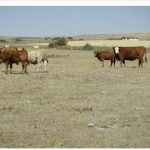SASKATOON – Farmers will have the last word on the fate of the Canadian Wheat Board, says a member of the panel that has proposed a radical restructuring of the grain marketing agency.
Owen McAuley, a Manitoba farmer and member of the Western Grain Marketing Panel, said if farmers don’t like the panel’s suggestions, they should tell the government.
“The way you want to test any proposal is you develop a policy and then you go stand in front of 100 farmers and ask them about it,” he said in an interview last week. “If there’s a fault in the logic somewhere, they’ll damn soon tell you.”
Read Also

Land crash warning rejected
A technical analyst believes that Saskatchewan land values could be due for a correction, but land owners and FCC say supply/demand fundamentals drive land prices – not mathematical models
While the panel won’t be doing exactly that, agriculture minster Ralph Goodale has asked farmers to tell him what they think of the panel’s recommendations.
“Maybe they can come back and shoot huge holes in the logic of what we’re proposing,” said McAuley.
Fellow panelist Bill Duke said if farmers send the same message to the minister that they sent to the panel at the 15 country meetings held during the winter, it should reflect an extremely polarized farm population.
But he expressed some concern that one side or the other might organize a letter-writing campaign that will distort that reality: “Those who are the most disciplined at writing letters and lobbying and taking that approach, will send him the most faxes and letters.”
A senior wheat board official last week told a group of National Farmers Union members meeting near Saskatoon that if they want to preserve the wheat board’s marketing powers, they should act now: “I think the minister would take notice if he received 80,000 letters telling him to save the single desk system,” said Brian White, the board’s director of market analysis.
As the panel did its work during the winter and spring, members publicly expressed doubts whether they would be able to reach consensus on the most contentious issues, like whether the board should retain its monopoly on wheat and barley exports. But as it turned out, the nine panelists were able to produce a unanimous report.
Duke said the key was the outside research work which showed while buyers were willing to pay premium prices for the quality and consistency of wheat and malting barley, that wasn’t the case for feed barley.
“There was really not much problem around the table in arriving at our decision,” he said. “It was just simply following the logic of the research and it made sense. The logic outweighs the ideology.”
McAuley said after spending weeks traveling across the Prairies and hearing the widely divergent views on grain marketing issues, the panel decided that for the good of the industry, it was imperative to produce a unanimous report.
“I think that all the panel members felt after we’d been through the countryside … that somehow we need to get past this destructive debate and get on with some constructive dialogue and move the industry ahead,” he said.
Panelist Wally Madill, a consultant and former chief executive officer of Alberta Wheat Pool, said the panelists soon decided change was inevitable.
“There was a firm feeling in the group that the status quo was an unacceptable route.”
He said the panelists tried to narrow the debate down to a middle ground that was acceptable to everyone.
Not all of the panelists were happy with every aspect of the report. Some wanted minor classes of wheat on the open market, while others resisted erosion of the board’s control over barley. But after what McAuley described as an “intellectual debate, not a screaming match”, eventually the panel found that middle ground.
“I guess at the end of the day you had to make a compromise,” he said.
















